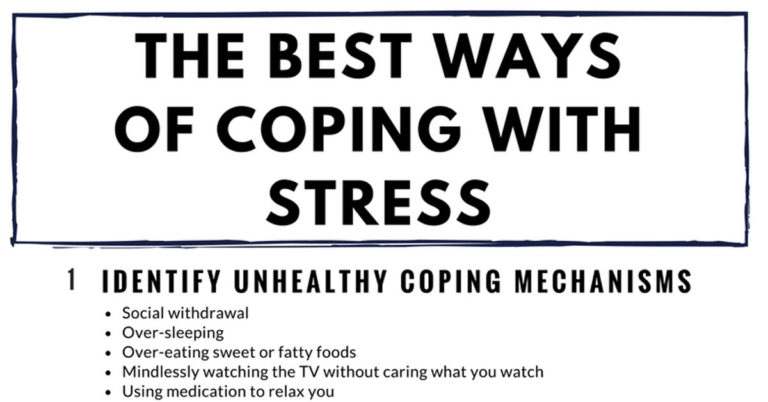

Everyone gets stressed, and you may assume there’s nothing you can do about it. For example, if you have lots of obligations at work and at home, surely you’re just stuck with the strain this puts on your physical and mental well-being. However, studies show that you have more control over your own stress than you might think.
Here are some helpful practical tips that will help you come up with a concrete action plan for dealing with stress (scroll down for a downloadable action plan and a free meditation audio).
Start by looking at the ways you currently respond to stress (keeping a stress journal can be helpful here, giving you a more objective perspective on your actions). Are any of your strategies unproductive, counterproductive, or downright unhealthy? Here are some examples of coping mechanisms that actually cause more stress down the line:
Research consistently proves that physical activity both reduces stress levels and helps to prevent many of the negative side-effects of stressful life events. The great news is that you don’t need to run a marathon or devote all your days to the gym to enjoy the benefits of exercise.

Almost any type of physical activity will help purge you of tension and lead to the production of endorphins; those “feel-good” chemicals that boost mood and energy. Aim for 30 minutes of exercise 3-5 times a week, but if your fitness levels are low then try starting out with just 10 minutes of activity.
As you exercise, tune into your bodily sensations and notice your own physicality; this is a form of mindfulness, which promotes stress control in itself. Here are some fun and easy ways to get your heart rate up:
Even though your intuitive response to stress might be to shut yourself away and avoid company, there’s plenty of evidence that social engagement plays a huge role in reducing stress regulating emotions.
In particular, it’s so important to have relationships in which you feel safe, seen and understood; this type of experience indicates you’re not in a dangerous situation, which calms you by directly changing the balance of neurotransmitters produced by your brain.
Keep in regular contact with people who offer support, and remember that there’s no weakness or shame in showing your emotions; your loved ones will appreciate the insight into your inner life, and it will bring you closer. Meanwhile, if you’re looking to brainstorm ways to build new social connections (or enhance existing ones), consider the following:
How you respond to negative thoughts plays a major role in dictating stress levels. After all, when you entertain a negative belief about yourself or your life, your body responds as though you’re currently stressed. In turn, this typically leads to more melancholy thoughts.
There are a few things you can do to shift your attitude. Firstly, deliberately reframe life’s challenges; ask yourself what opportunities they might present, engage in active problem-solving, and try to find something useful to learn.
Secondly, put your problems into perspective; will you really care about the present difficulty in a month or a year? If not, it’s not really worth getting upset about now, either.
Thirdly, try to avoid perfectionism. Set yourself realistic, practical goals rather than setting yourself up for failure by expecting yourself to be flawless every time. Aim to be “good enough”, not perfect.
Finally, it’s very powerful to know you have the resources to counteract stress. What can you put in your metaphorical stress relief toolkit in order to recharge? There are hundreds of potential things to include, but here are some ideas to get you started:
Reach into your stress relief toolkit every day, not just when you’re overwhelmed; doing something you love every day can help to combat stress before it even starts.
